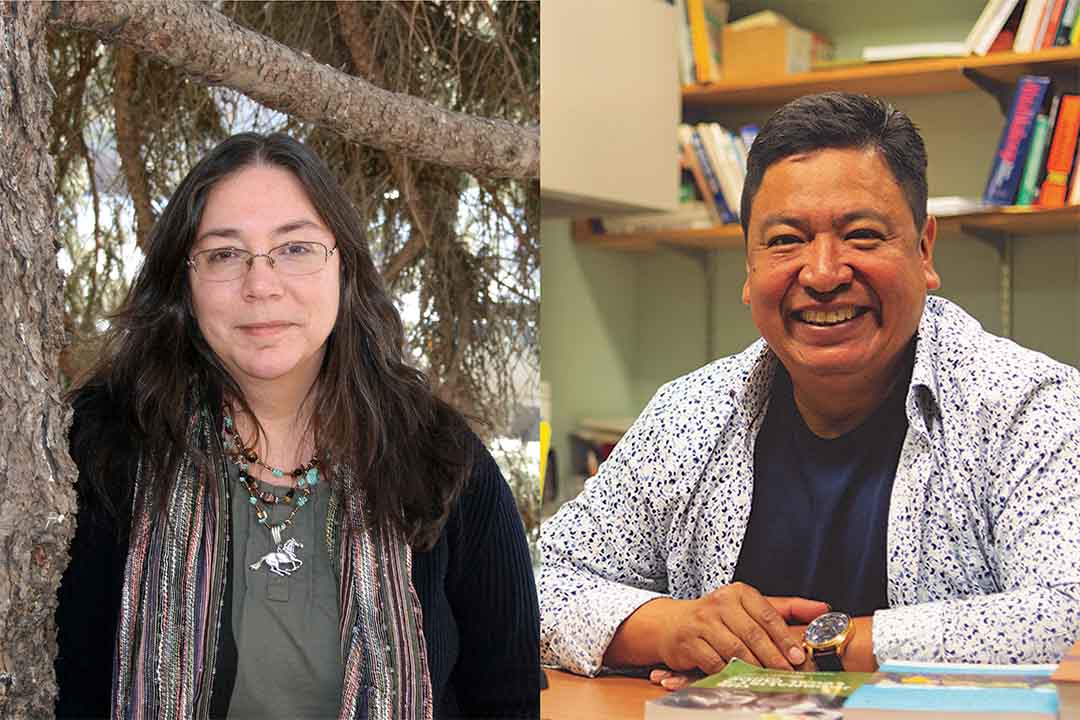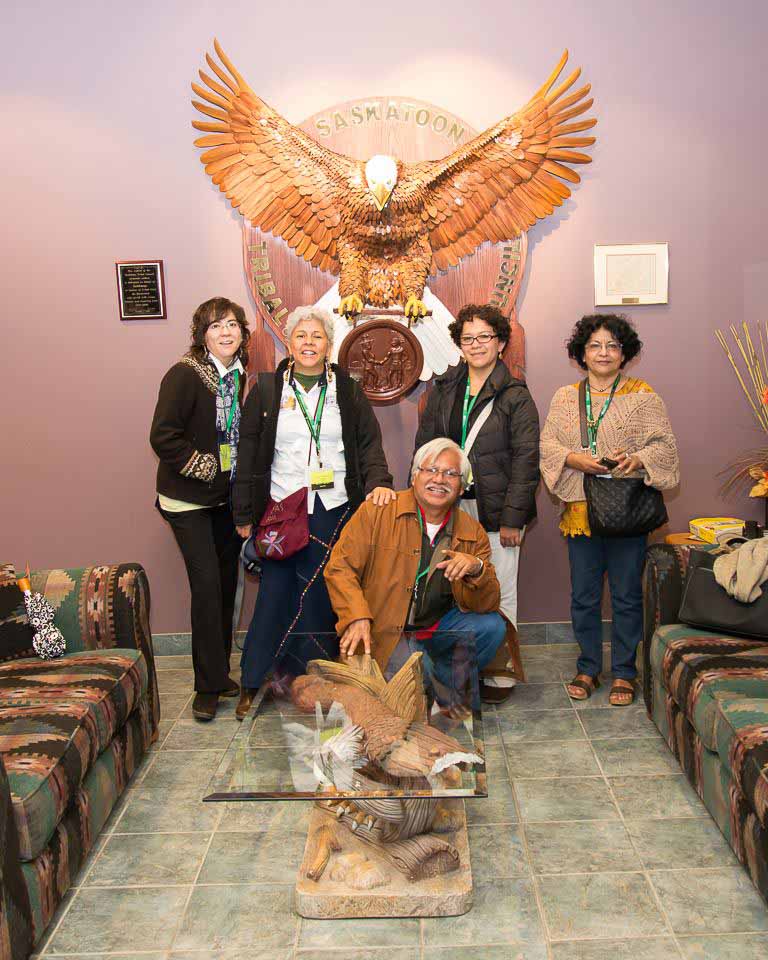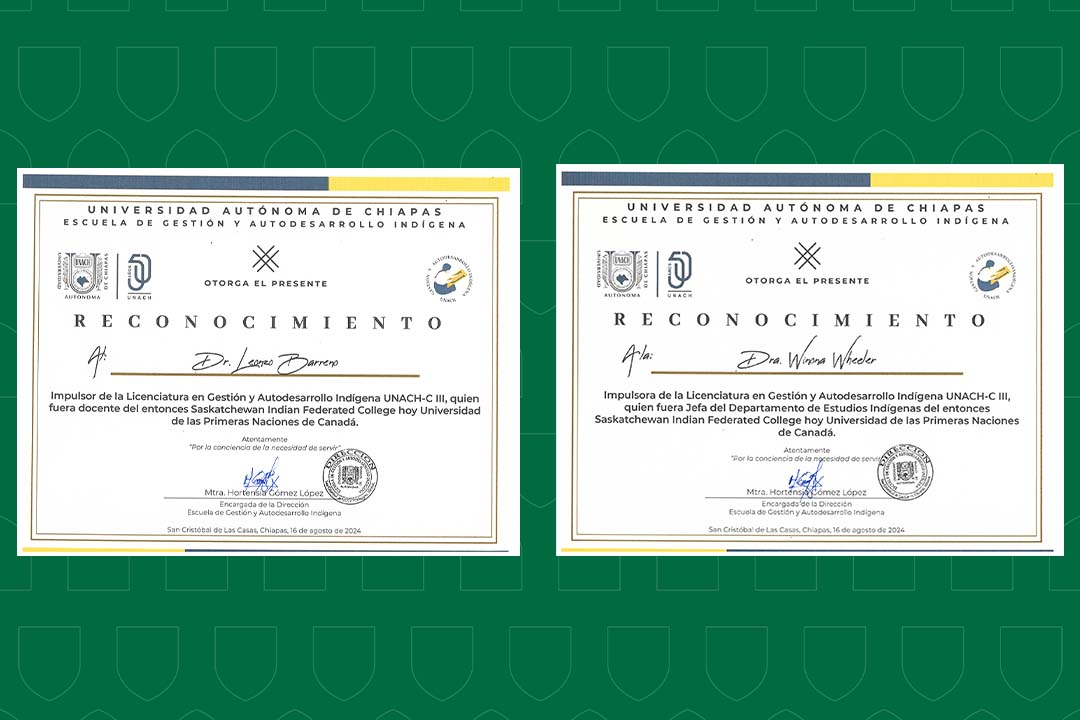
Making international connections in Indigenous education
Two USask Indigenous Studies faculty members played significant roles in establishing Indigenous university programming in Mexico 20 years ago
By Kristen McEwenMore than 20 years ago, a group of Indigenous scholars from Treaty 6 and Treaty 4 Territories travelled to Chiapas, Mexico to assist Mayan groups and scholars in establishing their own programs.
In August, USask Department of Indigenous Studies faculty members Drs. Winona Wheeler (PhD) and Leonzo Barreno (PhD’20) were recognized for their contributions in the creation of the School of Indigenous Management and Self-Development at the Autonomous University of Chiapas (UNACH). The school recently celebrated its 19th anniversary.
“One of the things we learned in 1998 was that there were no Indigenous Studies degree programs in Mexico” Wheeler said.
“There’s a whole lot of political and historical reasons for that – the major one being that the relations between the Mexican State and Indigenous peoples were not very good,” Barreno said.
Beginning in 1998, Wheeler, and several faculty from the Saskatchewan Indian Federated College (SIFC)--now the First Nations University of Canada (FNUniv)—visited UNACH campuses in Chiapas, Mexico over a period of five years. Wheeler—who is a member of the Fisher River Cree Nation in Treaty 5 Territory—was the head of the USask Department of Indigenous Studies at the time.
Barreno—who is K’iche’ Maya from Guatemala—was the coordinator of International Programs and then Director of the Center for International Indigenous Development at the SIFC. He saw his role as being a bridge between the two cultures – Latin America and North America. He started to work in the the project in 2001 after taking over from his predecessors Ronald Hoenes and Del Anaquod. The program ended in 2004. Other members of the scholarly delegation included: Dr. Carl Beal and Rodolfo Pino from FNUniv.
The research team received a $500,000 grant from the Canadian International Development Agency (CIDA), which enabled the team to travel to meet their academic colleagues in Chiapas and for the UNACH team to visit Canada.
Two post-secondary programs were developed out of this project: A Masters of Indigenous Education offered at the UNACH Tuxtla Gutierrez campus, followed by the Licenciatura (BA) which became the School of Indigenous Management and Development offered at the San Cristóbal de las Casas campus.
“We spent a lot of time talking about the needs of Indigenous communities,” Wheeler said. “From their perspective, what the needs were of Indigenous communities, what kind of Indigenous knowledge existed.”
The discussions between the delegations focused on the emergence of Indigenous Studies as a field of research in Canada.
“There were a lot of discussions, especially about traditional knowledge outside of anthropology, outside of history—Indigenous knowledge in its own right,” she said.
“It was a pretty exciting time,” Wheeler said. “It was a really humbling experience for me because I realized how little I knew about the Indigenous world outside my little enclave here. I learned so much and the people treated us so well.”
The second degree, Licenciatura (BA) in Indigenous Management and Self-Development, was challenging to establish at the university, in part due to the political landscape in Chiapas at the time.
Local scholars named the programs and created content for the courses, inspired by their counterparts. The research team from Canada provided support by talking about existing courses they created, taught, and participated in.
“Here in Canada (and US), Indigenous scholars, First Nations and Native Americans – they have advanced faster than many other regions of the continent—I'm talking about Latin America,” Barreno said.
“Many of the terms, the language, used here sometimes is very politically charged (in Latin America),” he added. “What I appreciated from Winona and the others, was not to impose their beliefs on people, and to right away understand the delicate situation of the region and Chiapas.”
A few years prior to the beginning of the research project in Chiapas, there was conflict between the Mexican government and the Zapatista Army of National Liberation.
“We didn’t want to get involved in that,” Barreno said. “Our business was higher education, and we have to respect their reality, respect what they wanted, and take what they thought was useful from (the discussions).”
The two delegations found common ground in shared experiences. “We recognized that our relationships with other Indigenous peoples were really important for support, and we had a shared history under colonialism, and shared experiences in education systems,” he said.

Wheeler added that the experience was a reminder that Indigenous peoples were not only in Canada, or the United States, but all over the world. Some Indigenous scholars have access to more resources than others—and it was important to help neighbours achieve goals they are striving for, she said.
The work to establish the programs gained momentum – enough that the programs were expanded and eventually led to the creation of the School of Management and Indigenous Self-Development in 2005.
In 2013, USask hosted the Native American and Indigenous Studies Association (NAISA) Conference. NAISA is an interdisciplinary, international organization that brings together scholars working in Native American and Indigenous Studies.
Scholars from the school in Chiapas came to USask and gave a panel presentation on the development of the programs and the school.
“It was the first time they were actually participating in an international forum of Indigenous Studies scholars,” Wheeler said. “There were Indigenous Studies scholars from all over Canada, the US, New Zealand, Australia. When they saw how powerful that the movement was for our discipline, I think that really empowered them to push ahead.”
“It was really a wonderful experience,” she said. “Lots of work, but a lot of good experiences.”
“We were in a position that does not happen very often amongst Indigenous peoples – of having access to these kinds of grant monies (CIDA). I thought that it was important that since we did have access to these kinds of funds, and they did not, that we support them to develop these education programs,” Wheeler added.
In August, Wheeler and Barreno both received certificates from the school, commemorating the roles they played in the development of Indigenous Studies programs that ultimately led to the creation of the school.
“For me, it shows this very Indigenous value that we don’t do things for ourselves,” Barreno said. “When we achieve something, we want others to have—to share in it.
“Before colonialism, our peoples were highly educated in their own way, but now through these institutions, we have found a way that we can continue that. The Indigenous concept of sharing is part of this whole thing – we do not do research for the sake of research—it must have a value. It has to have something that benefits people,” he said.
Barreno noted that each person on the research team played an essential part, and he wanted to ensure to thank those who were part of this program.
“Receiving the recognition feels good,” he said. “It encourages me to continue with (Indigenous Studies) and sharing our knowledge and resources with people. It might not be much, and we still have problems as Indigenous scholars, but that doesn’t stop us.”

Article originally published at https://artsandscience.usask.ca
Together, we will work towards Truth and Reconciliation. We invite you to join by supporting Indigenous achievement at USask.


